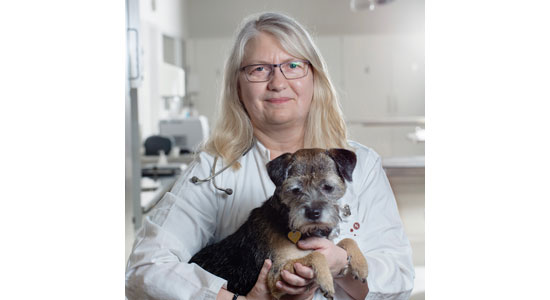Click here to read the curriculum in the course catalogue.
Course code: SCAM13001U
Veterinary Methodology and Paraclinical Skills
This course is a part of

The course adopts a veterinary methodology with a paraclinical perspective on the work-up of companion animal patients. It emphasises the importance of a systematic approach to clinical decision-making, centred on the companion animal patient.
This approach is illustrated through the use of the Problem-Oriented Medical Record (POMR), alongside the integration of theoretical knowledge and practical skills in key paraclinical methods.
The course provides the students with theoretical and practical knowledge and skills for using microscopy as a solid diagnostic tool in companion animal practice.
The course also emphasizes the importance of systematic evaluation of radiographs and provides students with knowledge of different image modalities applicable in companion animal clinical practice.
Knowledge of ethics, welfare, management and communication tools both in respect to fellow colleagues but also the clients met in clinical practice are also parts of the course.
Read more about the specialisation tracks and the Master's programme on the main page:
It was a great learning opportunity that provided valuable insights and skills. I would gladly recommend this course.
Course directors on »Veterinary Methodology and Paraclinical Skills«

Annemarie Thuri KristensenProfessor |

Lise Nikolic NielsenProfessor MSO |
Course details for »Veterinary Methodology and Paraclinical Skills«
Dates and examination
Course dates
3–7 November 2025
The course is available every other year.
Examination
Please find dates and details about the exam in the exam schedule.
Learning outcomes
On completion of the course, you will be able to:
Knowledge
-
Define veterinary methodology and paraclinical tools in systematic clinical decision making in dedicated companion animal clinical practice.
-
List the systematic approach to the complex companion animal patient using POMR and be able to explain, reflect about and demonstrate overview of systematic clinical decision making.
-
List and explain the systematic approach to microscopy of companion animal cytology and hematology specimens including sample collection and preparation procedures.
-
Explain the systematic approach to interpretation of laboratory results.
-
List and explain the systematic approach to evaluation of existing and new veterinary imaging approaches in companion animal clinical practice and their advantages and disadvantages.
-
Reflect about key ethical and welfare considerations, and the key communication and management issues in companion animal practice.
Skills
-
Apply the methodologies and tools and use and adjust relevant equipment.
-
Prepare blood smears.
-
Evaluate and interpret normal and abnormal blood and cytology smears from companion animal patients including differentiating between inflammatory categories and malignant and benign lesions. Plan and implement additional work up based on analysis and interpretation of these in complex clinical situations.
-
Apply the systematic approach to reading and interpreting radiographs in companion animal patients and plan and implement additional work up based on analysis and interpretation of these in complex clinical situations.
-
Communicate effectively and discuss relevant problems and questions within the systematic approach to complex patients with both peers and and clients.
Competences
-
Collaborate and communicate within and between both specialist, dedicated companion animal and mixed practice peers and lay persons involved in companion animal patient management.
-
Plan and reflect about the use of veterinary methodology and paraclinical tools.
Admission criteria
This course is only available for students enrolled on Master of Companion Animal Clinical Science.
You must meet the following criteria:
- Hold a degree in Veterinary Medicine.
- Have a minimum of 2 years of relevant job experience from companion animal practice.
- Be proficient in English.
Read more about admission on the main page of Master of Companion Animal Clinical Science.
Tuition fees
EU/EEA citizens
31,500 DKK
Non-EU/EEA citizens
36,800 DKK
Tuition fees include course materials, lunch and coffee. Books are not included in the tuition fees and must be purchased by the participants.
Citizens of the EU, EEA or Switzerland are entitled to a subsidised tuition fee, due to EU legislation.
Location
University of Copenhagen
University Hospital for Companion Animals
Dyrlægevej 16
1958 Frederiksberg
Denmark
Contact
Christine Gulstad
Study Administration Officer
lifelonglearning@adm.ku.dk
Tlf: +45 35 32 12 73

